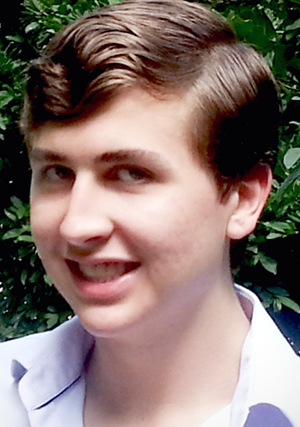 Kerry was awarded $350 by FFRF for his essay.
Kerry was awarded $350 by FFRF for his essay.
Being a young atheist in North Carolina’s bible belt is challenging. Atheism is reduced here to merely a negation of a “normal” theism. When I have presented my worldview, I have been ridiculed and ostracized.
Even worse, I have been coerced to publicly attest to beliefs I do not hold — in other words, to lie — to gain recognition for community service.
Last year in my advanced placement U.S. government and politics class, our teacher asked us to raise our hand if we thought “under God” should be removed from the Pledge of Allegiance. Mine was the only hand raised. The fundamentalist Christians surrounding me argued the pledge could not be changed because it is “tradition” and “God” can refer to any faith’s deity.
I explained that I was an atheist and that “under God” implied that any American should have theistic faith, therefore fundamentally yoking government with religion and disrespecting any secular worldview. I also countered that God was not originally in the pledge, shooting down the “tradition” claim.
Unfortunately, my peers shunned me for my honesty, ridiculing me as a “crazy left-wing extremist,” which shows how punitive the bible belt can be toward atheists. I grew up with a secular-atheist father and a Buddhist-atheist mother, but because these classmates had grown up with no atheists, they automatically labeled me an aberration.
When I informed them that about one-fifth of Europeans are atheist, they still could not accept my disbelief. As far as I could tell, I was never again taken seriously on any issue in government class, my favorite high school course.
My atheism led to even greater challenges in the Boy Scouts of America. I enrolled in Cub Scouts with a friend and enjoyed it. Although heavily Christian-themed, the program taught many practical skills and citizenship. I would just be quiet during prayers or scripture readings, so my atheism did not affect my acceptance into Cub Scouts.
But years later as a Boy Scout, I was required to take an oath to God at the start of each meeting. Although I would silently mouth the words, I learned something that ultimately led me to leave the group: To become an Eagle Scout, one must subscribe before a committee to belief in God.
I asked my secular friend from Cub Scouts how he planned to address the Eagle committee’s faith requirement. He said that he would simply lie and say that he was Christian. On hearing this from my close friend, I became completely disillusioned with the Boy Scouts.
They were bullying children into lying about their core views. Incredibly, the issue was not even allowed to be discussed. My research showed that many people, both secular and religious, thought the requirement should end. Some Eagle Scouts even mailed back their medals in protest.
Not willing to abandon my values, I left scouting without my Eagle medal.
Both of the above experiences taught me that being secular, especially in a zealously religious region, can not only cause altercations with my peers, but can bar me from positions in American institutions.
When I relinquished my Eagle rank, I joined the Obama reelection campaign, hoping to forge a new path of public service. Even so, I know that admitting I do not believe in God may jeopardize even being heard, much less elected or appointed.
Nevertheless, I meet that challenge here, because normalizing rational disbelief has to start somewhere if we are to be a truly ethical nation “with liberty and justice for all.” Let it begin with me.
Kerry Foerst, 18, graduated from Green Hope High School in Cary, N.C., and will attend the University of North Carolina at Chapel Hill to study strategic communications in the School of Journalism and Communication. He hopes to attend law school after completing his undergraduate degree with a view to eventually working in politics.